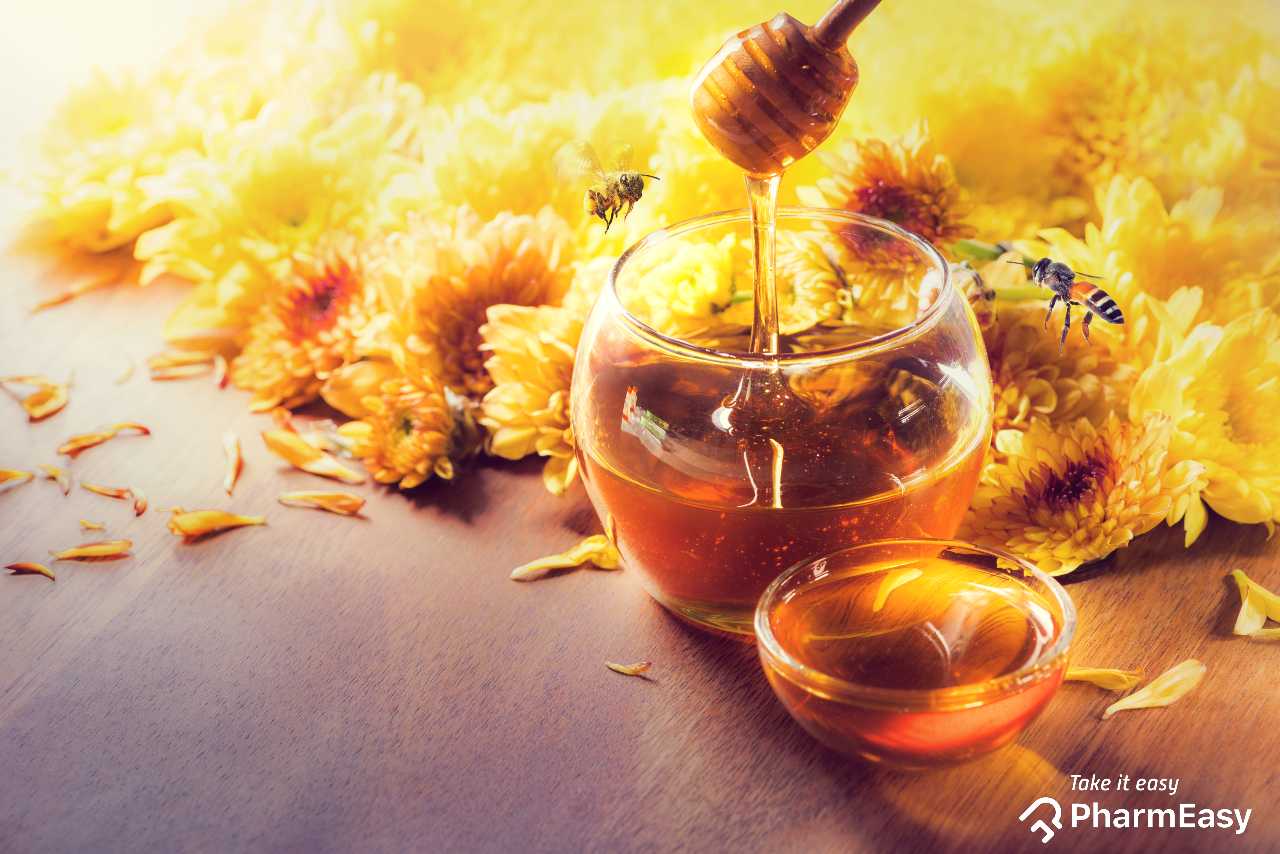Honey: Uses, Benefits & Side Effects
By Dr Siddharth Gupta +2 more

Get,

to manage your symptom
Get your,


4 Cr+ families
benefitted

OTP sent to 9988776655



You’ve successfully subscribed to receive
doctor-approved tips on
Whatsapp

Get ready to feel your best.

Hi There,
Download the PharmEasy App now!!


Register to Avail the Offer
Send OTPBy continuing, you agree with our Privacy Policy and Terms and Conditions

Hi There,
Sign up on PharmEasy now!!
Trusted by 4 crore+ families

OTP sent to 9988776655



You have unlocked 25% off on medicines




Code: NU25
By Dr Siddharth Gupta +2 more
Table of Contents
Since ancient times, honey has been considered one of the most valued and appreciated food products. It is a natural product formed from the nectar of flowers by honeybees, also called Apis mellifera, belonging to the family Apidae. Honey is the only insect-derived natural product with potential nutritional, therapeutic, cosmetic, and industrial values. Honey might be helpful for several conditions like asthma, throat infection, eye diseases, hiccups, tuberculosis, dizziness, fatigue, piles, hepatitis, and constipation1.
Honey is a sweet, thick fluid produced by bees from plant nectars and is commonly used as a sweetener in food. It has several other names like Clarified Honey, Chestnut Honey, Beri Honey, Blossom Honey, Buckwheat Honey, Honeydew Honey, Madhu, Honig, Jellybush Honey, Manuka Honey, Medihoney, Langnese honey, Miel Blanc, Purified Honey, Tualang Honey, Wildflower and Thyme Honey, and Strained Honey2.

Honey contains the following nutrients:
Did you know that honey has been used as a medicine for thousands of years? Stone age paintings provide evidence of its medicinal use dating back 8,000 years. Ancient scrolls, tablets, and books, including Sumerian clay tablets (6,200 BC), Egyptian papyri (1,900–1,250 BC), Veda (5,000 years ago), the Holy Koran, the Bible, and the writings of Hippocrates (460–357 BC), all highlight the widespread and longstanding use of honey as a beneficial substance6.
Dr. Siddharth Gupta, B.A.M.S, M.D (Ayu)
Honey might have several properties including1:

The property of honey due to antioxidant activity is related to the brightness of the honey. Darker honey has been found to have a higher value of antioxidants. In studies, the phenolic compounds present in honey are found to be responsible for antioxidant activity. It can be used as a dietary antioxidant1.
Oxidative stress damages the deoxyribonucleic acid (DNA). Reactive oxygen species (ROS), also called free radicals, have roles in diabetes, cancer, gastritis, ageing, Alzheimer’s disease, cardiovascular diseases, gastrointestinal disorders, and several ulcers. Honey contains antioxidant compounds derived from pollen sources and might have the ability to reduce these oxidative reactions. It might help remove the ROS and may reduce DNA damage4.

Honey might have the potential to reduce inflammatory responses as seen in cell cultures, animal models, and clinical trials (in humans)1. Mostly, inflammation occurs during the healing process. During the healing process, mild inflammation is considered normal but harmful. It triggers the activity of leukocytes and therefore produces free radicals. Honey contains polyphenols that have the oxidising ability and might provide a subsequent anti-inflammatory effect by reducing nitric oxide production4.
The phenolic content present in honey may be responsible for anti-inflammatory activity. The flavonoids and phenolic compounds present in honey might block the cyclooxygenase-2 and nitric oxide synthase, which are responsible for inflammation1.

Honey contains antioxidants like polyphenols, monophenols, flavonoids, vitamin C that may be linked with a reduced risk of heart failure1. In a study daily intake of flavonoids was found to be linked with a reduced risk of heart-related diseases. Flavonoids might have some effect on heart-related diseases maybe by improving the blood flow to the heart, lowering blood clotting, and inhibiting low-density lipoprotein from oxidising5. Heart conditions are serious and must be diagnosed and treated by a doctor. Therefore, kindly consult a doctor.
In my experience, I have observed that honey consists mainly of carbohydrates, making up around 95-97% of its dry weight. However, it’s not just about carbs. Honey also contains essential elements like proteins, vitamins, amino acids, minerals, and organic acids. All these components work together to provide various health benefits, making honey a remarkable natural remedy6.
Dr. Rajeev Singh, BAMS

In a study, honey used in type 1 and 2 diabetes was found to lower the glycaemic index more (glycaemic index shows how quickly each food affects the blood sugar level) compared with glucose or sucrose used in diabetic patients. There In a study, honey used in type 1 and 2 diabetes might have the potential to lower the glycaemic index more (glycaemic index shows how quickly each food affects the blood sugar level) compared with glucose or sucrose used in diabetic patients. There was a lower rise in plasma glucose levels in diabetic patients given honey compared to diabetic patients given dextrose. It might also lower the blood lipids, homocysteine, and C-reactive protein levels in diabetic patients. Also, it was found that honey might help promote the secretion of insulin, may lower blood glucose levels, might help raise haemoglobin concentration, and might improve the lipid profile5. Kindly consult a doctor for the proper diagnosis and treatment of serious conditions such as diabetes.

The most effective and most studied use of honey might have potential wound healing properties. Applying honey as a wound dressing might help improve the healing process and may help quickly clear the infection. It might have a cleansing action on wounds, may help tissue regeneration, and might lower inflammation5. However, more research is required.

In traditional medicine, in traditional medicine, the antibacterial activity of honey is one of the most significant findings that was first recognised in 1892. It has been reported that honey might have an inhibitory effect on around 60 species of bacteria, including gram-positive, gram-negative, aerobes (microorganisms that grow in the presence of oxygen), and anaerobes (microorganisms that grow in the absence of oxygen). Honey may act as both bactericidal (kills bacteria) and bacteriostatic (stops bacterial growth) depending on the concentration used5.

Honey is described in a study as a potential effect of acting as a cancer vaccine as it might lower prolonged inflammation which is considered a risk factor for the growth of cancer. Honey might have high antioxidant content, and therefore it might show anticancer activity by stopping the spread of various cancer cells and enhancing the early death of these cancer cells. These cancer cells might include sarcomas, bone cancer, carcinomas, cancer cell lines, experimental cancers, and breast cancer3. However, cancer is a serious condition and must be diagnosed and treated by a doctor.
Though there are studies that show the potential uses of honey in various conditions, these are insufficient, and there is a need for further studies to establish the true extent of the benefits of honey on human health.
Based on my experience, I have observed that honey may offer benefits for neurological diseases. It has shown anxiolytic effects for reducing anxiety and also acts a potential antidepressant, anticonvulsant, and antinociceptive agent. Honey’s ability to reduce oxidative stress in the central nervous system can contribute to improved neurological health6.
Dr. Smita Barode, B.A.M.S, M.S.
Honey can be used:
Your Ayurvedic physician will prescribe you the form and dose as per your requirement.
You must consult a qualified doctor before taking any herbal supplements. Do not discontinue or replace an ongoing treatment of modern medicine with an ayurvedic/herbal preparation without consulting a qualified doctor.
Honey is primarily safe for most adults, but if the honey is produced from the nectar of rhododendrons (plant species, also called red tree), then it is relatively unsafe, as it may contain toxins that might cause chest pain, heart problems, and low blood pressure2.
Also Read: Aloe Vera: Uses, Benefits & Side Effects
Therefore, honey should be used cautiously.
Therefore, kindly consult a doctor and confirm if it is safe for you to consume honey.
Also Read: Pink Himalayan Salt: Uses, Benefits, Side Effects, Precautions & More!
No, applying honey for acne on the face doesn’t treat acne2.
Honey might be helpful for wounds. It might help reduce the pus and odour, may clean the wound, might lower the infection and pain, and may reduce the time for healing2. However, sufficient scientific evidence is not present. Therefore, ensure that you consult a doctor and get your wounds properly treated. Kindly do not self-medicate.
Applying honey preparations to burns may have the potential to help improve healing2. However, more research is required. Kindly consult a doctor. Do not self-medicate.
Honey might be used for application directly to the face, and it may help lower the redness2. However, more research is required to ascertain such possible effects of honey.
Honey is mainly found to be safe in adults, but it can be unsafe if the honey is produced from the nectar of rhododendrons. It may contain toxins that cause chest pain, low blood pressure, and heart problems2.
There is no sufficient data on its safe usage during pregnancy. Consult your doctor before using honey during pregnancy.
Avoid giving honey to infants under 12 months of age. It can be given to older children and adults2.
There is insufficient data on its safe usage during breastfeeding. Consult your doctor before using honey during breastfeeding.
Honey may be helpful for constipation1. However, more research is required to prove such effects. Kindly consult a doctor.
Allergic reactions to honey are rare but can be caused either due to bee protein or pollen in honey5.
Also Read: Sabudana: Uses, Benefits, Side Effects & More!
Disclaimer: The information provided here is for educational/awareness purposes only and is not intended to be a substitute for medical treatment by a healthcare professional and should not be relied upon to diagnose or treat any medical condition. The reader should consult a registered medical practitioner to determine the appropriateness of the information and before consuming any medication. PharmEasy does not provide any guarantee or warranty (express or implied) regarding the accuracy, adequacy, completeness, legality, reliability or usefulness of the information; and disclaims any liability arising thereof.
Links and product recommendations in the information provided here are advertisements of third-party products available on the website. PharmEasy does not make any representation on the accuracy or suitability of such products/services. Advertisements do not influence the editorial decisions or content. The information in this blog is subject to change without notice. The authors and administrators reserve the right to modify, add, or remove content without notification. It is your responsibility to review this disclaimer regularly for any changes.
Comments

Leave your comment...
You may also like
Comments